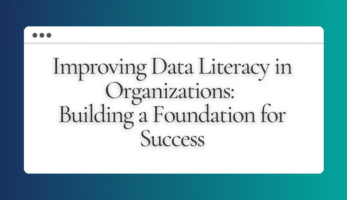HRIS, Human Resources
Improving Data Literacy in Organizations: Building a Foundation for Success

In today’s data-driven world, organizations rely on their systems and technologies to streamline processes, ensure compliance, and make informed decisions. At Exude Human Capital Consulting, we bring expertise working with a wide range of HR technologies and have seen firsthand how improving data literacy within the workforce can transform an organization. It’s not just about implementing the right tools—it’s about fostering a culture of understanding, accountability, and purpose. Based on our extensive experience with clients across industries, here’s how organizations can enhance their data literacy to fully leverage their HR systems and drive meaningful results for the entire organization.

1.Define the Purpose of Each System or Technology
The first step in improving data literacy is to clearly articulate the purpose of every technological system or data element within the organization. Employees need to understand why the system exists and what value it brings. These purposes might include:
- Compliance: Ensuring all processes and records adhere to regulatory and organizational standards.
- Decision-Making: Using data to guide strategic and operational choices.
- Oversight and Management: Monitoring activities to ensure accountability and performance.
- Revenue Generation: Identifying opportunities to increase profitability.
- Necessity: Meeting baseline operational requirements.
When employees understand the “why,” they are more likely to engage meaningfully with the “how.”
2. Clarify Expectations for Each User Role
Data literacy isn’t one-size-fits-all. Each role in your organization has a unique relationship with data. By aligning these responsibilities to the system’s purpose, you can foster accountability and clarity:
- Employees: Ensure data is entered completely and on time, such as updating patient records or customer details.
- Managers: Oversee data accuracy and hold teams accountable, conducting quality assurance to validate content.
- Administrators: Identify patterns of non-compliance, maintain system configurations, and ensure infrastructure integrity.
When each user understands how their role contributes to the system’s larger purpose, data management becomes a shared responsibility.
3. Underscore the Importance of Data Integrity and the Impact
At its core, data integrity is about ensuring that the “pieces of the puzzle” fit together. Here’s why this matters:
- System Administrators act as the stewards of the big picture. They understand how systems are built and how data should flow, much like seeing the image on a puzzle box.
- End Users contribute individual pieces of the puzzle—data elements that must be entered accurately, completely, and in a timely manner.
When users fail to “place their puzzle pieces” correctly, the bigger picture becomes blurry or incomplete. This breakdown impacts the organization’s ability to see trends, ensure compliance, or make data-driven decisions.
4. Reinforce That Data Integrity Drives Value
The success of any system lies in its ability to deliver on its intended purpose. If the data feeding the system is inaccurate or incomplete, it undermines the value of the entire operation.
For example:
- Compliance concerns may go unnoticed.
- Decision-makers might lack the insights needed to act effectively.
- Revenue opportunities could be lost due to gaps or errors.
Everyone has a role in maintaining data integrity. When each individual takes ownership of their “puzzle pieces,” the organization can unlock the full potential of its systems, driving value and achieving its goals.
At Exude Human Capital, our consultants are technology agnostic, which provides the ability to plug into a variety of systems. We provide support with vendor selection, implementation, or optimization to connect people to the process and the technology. We emphasize that improving data literacy isn’t just about technical skills—it’s about fostering a mindset of responsibility and purpose. By defining system goals, clarifying user roles, and prioritizing data integrity, organizations can transform their relationship with data, ensuring it becomes a powerful tool for greater efficiency and value
Let’s work together to build a data-literate workforce and maximize the impact of your HR systems. Contact Exude Human Capital Consulting today to learn more!







